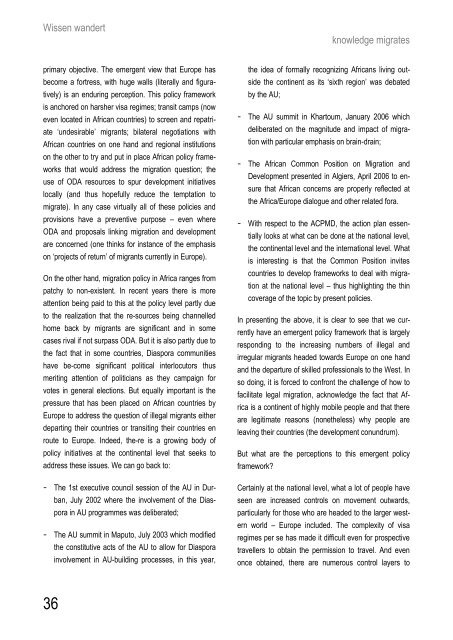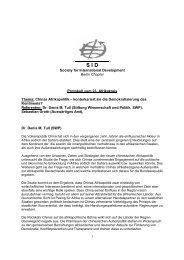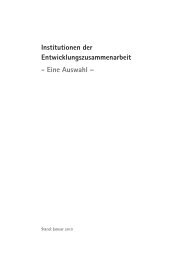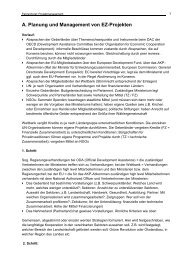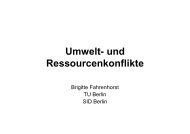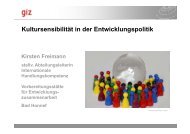Konferenzbericht (PDF-Dokument, 3 MB) - SID
Konferenzbericht (PDF-Dokument, 3 MB) - SID
Konferenzbericht (PDF-Dokument, 3 MB) - SID
Erfolgreiche ePaper selbst erstellen
Machen Sie aus Ihren PDF Publikationen ein blätterbares Flipbook mit unserer einzigartigen Google optimierten e-Paper Software.
Wissen wandert<br />
primary objective. The emergent view that Europe has<br />
become a fortress, with huge walls (literally and figura-<br />
tively) is an enduring perception. This policy framework<br />
is anchored on harsher visa regimes; transit camps (now<br />
even located in African countries) to screen and repatri-<br />
ate „undesirable‟ migrants; bilateral negotiations with<br />
African countries on one hand and regional institutions<br />
on the other to try and put in place African policy frame-<br />
works that would address the migration question; the<br />
use of ODA resources to spur development initiatives<br />
locally (and thus hopefully reduce the temptation to<br />
migrate). In any case virtually all of these policies and<br />
provisions have a preventive purpose – even where<br />
ODA and proposals linking migration and development<br />
are concerned (one thinks for instance of the emphasis<br />
on „projects of return‟ of migrants currently in Europe).<br />
On the other hand, migration policy in Africa ranges from<br />
patchy to non-existent. In recent years there is more<br />
attention being paid to this at the policy level partly due<br />
to the realization that the re-sources being channelled<br />
home back by migrants are significant and in some<br />
cases rival if not surpass ODA. But it is also partly due to<br />
the fact that in some countries, Diaspora communities<br />
have be-come significant political interlocutors thus<br />
meriting attention of politicians as they campaign for<br />
votes in general elections. But equally important is the<br />
pressure that has been placed on African countries by<br />
Europe to address the question of illegal migrants either<br />
departing their countries or transiting their countries en<br />
route to Europe. Indeed, the-re is a growing body of<br />
policy initiatives at the continental level that seeks to<br />
address these issues. We can go back to:<br />
- The 1st executive council session of the AU in Dur-<br />
36<br />
ban, July 2002 where the involvement of the Dias-<br />
pora in AU programmes was deliberated;<br />
- The AU summit in Maputo, July 2003 which modified<br />
the constitutive acts of the AU to allow for Diaspora<br />
involvement in AU-building processes, in this year,<br />
knowledge migrates<br />
the idea of formally recognizing Africans living out-<br />
side the continent as its „sixth region‟ was debated<br />
by the AU;<br />
- The AU summit in Khartoum, January 2006 which<br />
deliberated on the magnitude and impact of migra-<br />
tion with particular emphasis on brain-drain;<br />
- The African Common Position on Migration and<br />
Development presented in Algiers, April 2006 to en-<br />
sure that African concerns are properly reflected at<br />
the Africa/Europe dialogue and other related fora.<br />
- With respect to the ACPMD, the action plan essen-<br />
tially looks at what can be done at the national level,<br />
the continental level and the international level. What<br />
is interesting is that the Common Position invites<br />
countries to develop frameworks to deal with migra-<br />
tion at the national level – thus highlighting the thin<br />
coverage of the topic by present policies.<br />
In presenting the above, it is clear to see that we cur-<br />
rently have an emergent policy framework that is largely<br />
responding to the increasing numbers of illegal and<br />
irregular migrants headed towards Europe on one hand<br />
and the departure of skilled professionals to the West. In<br />
so doing, it is forced to confront the challenge of how to<br />
facilitate legal migration, acknowledge the fact that Af-<br />
rica is a continent of highly mobile people and that there<br />
are legitimate reasons (nonetheless) why people are<br />
leaving their countries (the development conundrum).<br />
But what are the perceptions to this emergent policy<br />
framework?<br />
Certainly at the national level, what a lot of people have<br />
seen are increased controls on movement outwards,<br />
particularly for those who are headed to the larger west-<br />
ern world – Europe included. The complexity of visa<br />
regimes per se has made it difficult even for prospective<br />
travellers to obtain the permission to travel. And even<br />
once obtained, there are numerous control layers to


